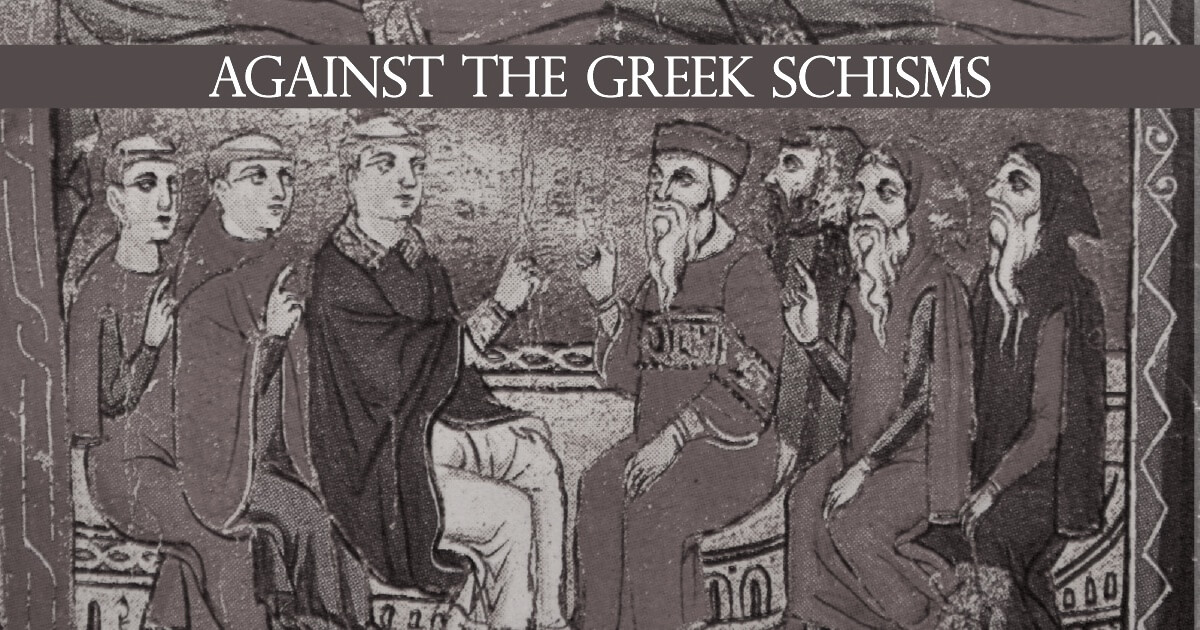Eternity intruding into time: the Incarnation throws everything off balance
‘When the fullness of time had come,” declares St Paul, “God sent his Son, born of a woman, born under the law, to ransom those under the law” (Gal 4:4-5). Of course, the apostle is not saying that chronological time had come to an end when the Word became flesh. Rather, at the appointed moment The post Eternity intruding into time: the Incarnation throws everything off balance first appeared on Catholic Herald. The post Eternity intruding into time: the Incarnation throws everything off balance appeared first on Catholic Herald.

‘When the fullness of time had come,” declares St Paul, “God sent his Son, born of a woman, born under the law, to ransom those under the law” (Gal 4:4-5). Of course, the apostle is not saying that chronological time had come to an end when the Word became flesh. Rather, at the appointed moment in chronological time, eternity intruded, changing the very nature of time as it had otherwise been known. Paul introduces us to a new quality of time. This time is not characterised by duration, but rather by crisis. The Incarnation of the eternal Word is the intrusion of eternity into time, transforming the very concept of time from duration to decision.
Flannery O’Connor captured this notion in her story “A Good Man is Hard to Find”. “Jesus thown everything off balance,” declared The Misfit in O’Connor’s story. “If He did what He said, then it’s nothing for you to do but thow everything away and follow Him.” In a 1957 letter, O’Connor explained what she did and did not mean by The Misfit’s declaration. “It’s not a matter… of Do Unto Others,” she wrote. “That can be found in any ethical culture series.” Rather, O’Connor continued, the story is about “Christ and the Incarnation, the fact that there has been a unique intervention in history… It is the fact of the Word made flesh.”
O’Connor’s point is that Jesus did not come merely to preach an ethical code, or to advocate a list of desirable behaviours. He was not a philosophical sage or a psychological guru. Indeed, many of the moral principles that Jesus represented are not unique to his ministry and message. As CS Lewis argues in his essay “The Way”, from The Abolition of Man, Christians adhere to moral codes that are found in other religious and philosophical traditions. Even Christian theologians often refer to “natural law” or “first principles of practical reason”, by which they mean moral precepts that are accessible by reason, apart from any special revelation from God or preaching of Jesus.
The Misfit’s declaration means that Jesus’s mission is not about modifying moral behaviour or advocating new ethical standards. Rather, the Incarnation forces us to make an existential decision. The Incarnation is the intrusion of eternity into time; and its effect is to call us to make an eternal judgment in every moment of our lives.
This decision is not to subscribe to a list of moral rules or legal precepts. Rather, it is to embrace the eternal Word of God, and thus to transform the temporal world in which we live. The Incarnation is a summons from the everydayness of our chronological lives to embrace the mystery of our eternal lives. The Incarnation introduces a new kind of time. The Incarnation is not merely a chronological event. It is an eternal event at a moment in time, thereby transforming every moment into call for conversion.
In his introduction to WH Auden’s Christmas poem “For the Time Being”, American literary theorist Alan Jacobs explains that the Incarnation “comes to us as fate because we have no power to alter or delay its arrival”. This is what I mean by the intrusive nature of the Incarnation. When the eternal Word inserts Himself into time, he demands a decision. The demand is not in the form of a verbal instruction, but rather in the form of an experiential sign. It is a critical moment that requires a response. As such, the Incarnation does not present us with a choice of whether or not to embrace the eternal Word. Rather, the choice is whether we bear true or false witness to the redemption that Incarnated eternity summons us to embrace.
This, Jacobs suggests, is the very meaning of the title of Auden’s poem. The “time being” is the condition in which we are “faced with the necessity of radical choice”. The eternal moment of the Incarnation “does not impose an interpretation but rather calls one forth from us”. The question is not whether Christ became flesh, but rather how we reply to it. As Auden himself put it in a later letter: “Christ appears looking just like any other man, yet claims that He is the Way, the Truth and the Life.” One may embrace or reject the claim; but one cannot ignore it. Christ confronts every person in time to make a decision for eternity.
As Jacobs summarises the point of Auden’s “For the Time Being”, “the Nativity narrative [is] nothing less than a kairos moment, an opportunity for his readers to see ‘the time being’ as infinitely rich in possibility and infinitely demanding of choice”. The Incarnation does not divide time into “before and after”, but rather into “yes or no”. Necessity inserts itself into contingency and, as such, requires a response. We may say yes or no. But we cannot abstain.
Kenneth Craycraft is professor of theology at Mount St Mary’s Seminary & School of Theology, Cincinnati, Ohio
![]()
The post Eternity intruding into time: the Incarnation throws everything off balance first appeared on Catholic Herald.
The post Eternity intruding into time: the Incarnation throws everything off balance appeared first on Catholic Herald.














